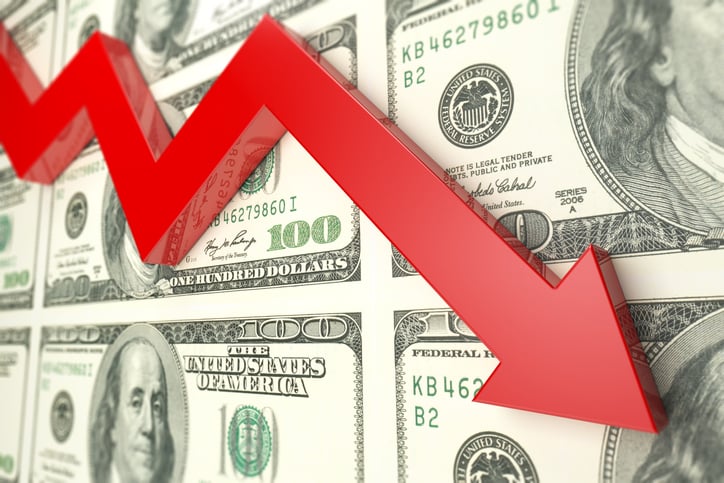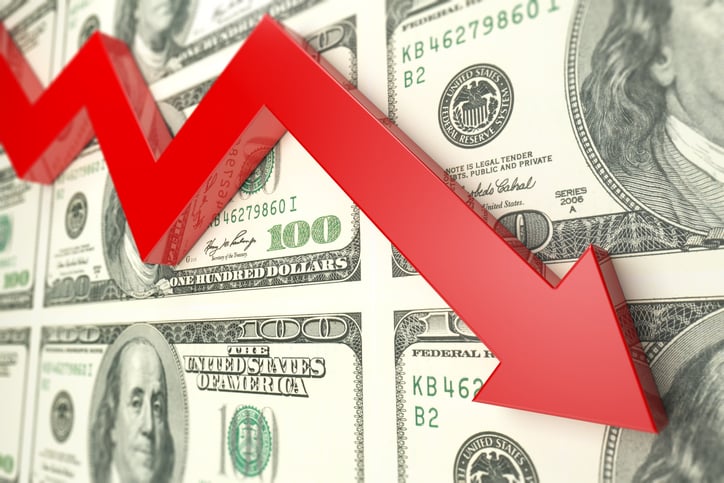Based purely on the net profit number it reported earlier this week, TD AMERITRADE (AMTD +0.00%) did not enjoy a good start to its fiscal 2013. 1Q's bottom line slumped by $5 million on a year-over-basis to $147 million, on net revenues that were essentially stagnant at $651 million. Given the fairly anemic environment for trading these days, that was to be expected. But other numbers posted by the brokerage give hope that better quarters might lie ahead.
Low expectations
Besides, the market wasn't hoping for much. The average analyst estimate had it that TD AMERITRADE results would show a profit that equated to $0.24 per share; calculated on that basis, actual bottom line came in $0.03 higher.
Nobody's expecting great things from the brokerage sector these days. Trading remains weak on a historic basis, which is why investors are inclined to estimate on the low end. Any upside surprise is welcome, so it was encouraging that the company's daily average revenue trades -- a key metric in this business -- actually grew slightly (by 2%) quarter over quarter to a little more than 334,000.
Thus far in this young quarter/year, things are looking better, with an 11% boost pushing DARTs to around 370,000... although the company admits this is "sluggish" for one of the busiest trading months of the year.
What investors are really looking for is alternate sources of revenue to make up for the shortfall, and TD AMERITRADE has a chance to boost this in a meaningful way. Net new client assets grew a very healthy 53% year over year to $15.6 billion -- a new record high -- widening the firm's pool of total client assets by 18% to over $480 billion.
All that new money is enticing, but there's a deepening need to find better places for it. The firm's clients, apparently, like having trading accounts, but they're not too fond of trading. Commission and transaction fees (i.e., the firm's cut from trading) came in at $257 million, or almost 40% of total net revenues. Unfortunately, this amount was $16 million lower than in 1Q the previous year, and barely moved ahead of the tally from the previous quarter.
As a result, the brokerage has deployed its sales force to pitch clients duller yet less potentially scary assets like mutual funds. This is a good move that's reaping benefits -- fees from what the company terms "investment products" climbed by nearly 30% year over year to $56 million.
Going forward, the trick will be to get more of that $480 billion into those fee-pumping "investment products". A 30% annual bump is nice, but that $56 million is less than 10% of 1Q's overall net revenues. And it has little company -- as with commission and transaction fees, the other revenue components didn't advance much, or at all.
The competition
It's tough out there for companies that have traditionally made their coin as stock market middlemen. Like TD AMERITRADE, they're trying hard to branch out into other asset classes, with varying degrees of success. Charles Schwab (NYSE: SCHW) has been pretty good at this, and the proof is on the income statement -- in its most recent quarter, the company grew revenue and net income at satisfying rates (by 9% and 29% year over year, respectively).
Like its all-capital-letters rival, Chuck notched a record in net new assets collection in its most recent quarter. It's a bigger operation than TD AMERITRADE, which helps, but it's also more successful in finding lucrative assets from which to squeeze fees. For example, it's got a clutch of exchange-traded funds, an asset class that has grown enormously in popularity with investors of late. Total assets in Schwab's branded ETFs amounted to $8.6 billion, and that number's well poised to advance; fees for several of its titles are among the lowest in the business, a great lure in the effort to attract new money and boost volume.
On the opposite side of the dollar bill is E*TRADE (ETFC +0.00%), which, by the way, is to release results Thursday afternoon, so watch this space for the latest. Anyway, that brokerage is a purer wirehouse play than its two rivals, and thus struggling harder to make a buck.
That's a big reason why overall net revenues slumped deeper on an annual basis than with TD AMERITRADE, commissions dropped by 20%, and bottom line plunged well in the red with a nearly $29 million loss. The shortfall in trading isn't being sufficiently compensated by gains in other activities.
Diversification draws dollars
The moral of the story is, the more diverse the brokerage, the better its chances to provide good returns. TD AMERITRADE is midway between the dynamic Schwab and the stagnant E*TRADE in this respect.
At least it's making progress in this area, and wheeling and dealing effectively -- for example, it renegotiated the terms with its main shareholder, Toronto Dominion Bank (TD +0.62%), under which the latter will significantly lower its fees for holding the brokerage's client cash while interest rates remain low, in exchange for taking a higher cut when those rates move upwards.
Sure, this will make that activity more expensive for TD AMERITRADE, but a rate increase should be more than compensated by the lift in revenue from various interest rate-sensitive products. And the short-term gains will be nice -- the company believes this will add around $30 million in net interest revenue this year.
So ultimately, although the brokerage's leading numbers weren't that great, some of its other metrics held up nicely or even showed a jump here and there. Considering that, it wasn't too shocking that the company's share price rose a little after those results were announced.








